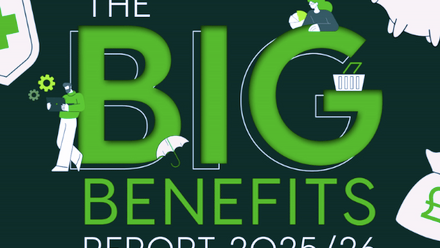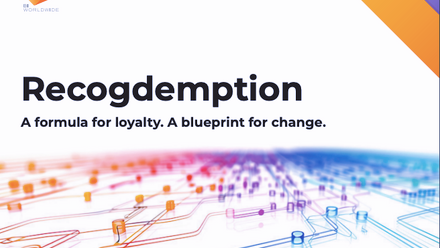Beyond the pub: New ways of building a positive workplace culture

Co-founder of Threshold Sports, Julian Mack, has witnessed how physical challenges can energise employees and lead to a raft of wellbeing benefits. Here he gives his thoughts on why alcohol-fuelled events are no longer the go-to for employee engagement and suggests new ways to create better workplace cultures.
Drinking seems to be the basis for team building and employee engagement in so many companies. Is it time to call last orders on the booze culture?
It's important not to sound too worthy - there are high and low moments when we all need our personal equivalent of a glass of wine - but, yes, we think relying on a pub session as a tool for building culture is lazy, outdated and excluding. Even more so now that people are waking up to the benefits of looking after their minds and bodies better.
I'm biased. I run a company that organises outdoor challenges in the name of wellbeing, colleague bonding and fundraising. You can tick three boxes in one go.
Why did you set up Threshold Sports?
Initially my co founder, Olympian James Cracknell, and I wanted to create events that stretched people to achieve more than they ever thought possible. We designed those events to be iconic and tough.
We quickly realised that organisations could drive engagement objectives by participating in these events whether it was enhancing client relationships, fund raising or helping employees to get fitter and healthier.
There is no downside. People get fitter, feel greater self-esteem and raise millions of pounds for charitable causes. Since 2010, we've provoked over £25 million of fund raising by making people sweat on physical challenges - most recently organising the Duke of Edinburgh Awards Adventure, which saw over 700 Duke of Edinburgh alumni and friends braving the elements to trek across the Peak District to raise much needed funds for the charity.
Do you have any examples of what your clients are doing that you have found inspiring?
There's a great example from RBS, which was a corporate partner of Sport Relief 2016 and wanted to stage a UK-wide employee engagement challenge involving more than 1,500 staff to raise money.
We proposed a two-part campaign based around a five-day, 500-mile cycle ride between RBS's two main office hubs in London and Edinburgh. People could ride the full five days or choose from eight different shorter sections around the country. Meanwhile an in-office static bike challenge was set up for people who had less time or were less active involving offices from Jersey to Inverness.
The results were impressive. RBS became one of the biggest corporate fundraisers in Sport Relief's 30-year history - collecting £610,000 and smashing its target of £250,000. Some 95% of participants said the event had increased their pride in working for RBS. They also said it helped them form closer relationships with colleagues and improved their personal fitness and commitment to exercise. And the bank saw an unprecedented 15-point jump in engagement scores in its annual HR employee survey.
Another example is Bupa. For the past three years, they've been inviting employees, key clients and suppliers to join a day of physical and mental challenges in a beautiful rural setting. Teams of four compete in painting contests, mountain biking, bread baking, abseiling and other stretching but inclusive activities.
The event is over-subscribed because it's fun. But what they've found is that, away from conventional meeting rooms, people get to know each other properly and relationships are strengthened more effectively than by many other forms of hospitality.
I'm also proud of what we've achieved with Dixons Carphone as part of their ongoing sponsorship of the Race to the Stones ultra marathon. They devised the Average to Awesome programme for employees who wanted to take on the 100km walking challenge along the Ridgeway to Avebury Stones. The employees were provided with a top coach for a 12-week training programme, along with kit, technology and lots of encouragement.
Thirty-six employees have been on the programme and they've all reached personal goals. Between them they lost 100kg in weight. And many of them say they have sustained good exercise habits - most have even been back to walk or run the Stones even faster. Best of all is the group's feeling that they have made changes at home which have positive benefits for their kids - healthier mums and dads not getting out of breath playing football in the garden. And the effects of the programme reverberate around the whole company.
We are doing our own bit by introducing a "netwalking" event to share wellbeing best practice with like-minded people on a gentle 5km walk along the Thames before work. Funded by Bupa we have invited Karen Taylor, author of Deloitte's excellent report on workplace mental health and wellbeing, and several influential people who have the power to make a difference to people's health and wellbeing within their organisations, in the hope that they will find this a good chance to network while they walk. It's a good example of practicing what we preach in an accessible way.
Is there a danger that physical challenges can make some employees feel excluded?
We make sure that anyone can take part in our challenges from a fitness perspective. However, we still need to find ways of involving all the people back at the office who can't be at the live event but still want to be part of the action and to enjoy the health and self-esteem benefits.
Technology will be the key to unlocking the wider reach, but the challenge is to crack sustained engagement in wellbeing programmes. Here I think the trick is to have lots of different options available so people can select for themselves and not feel excluded by having to buy expensive equipment or be in a certain clique such as a running club.
Accenture is one company that has many varied, vibrant clubs and interest groups feeding the mind and the body as well as a diverse range of counsellors dealing with sleep issues, mental health, finance, diet and physio that employees can access. There's no stigma around it, just openness and resources. And they apply proper measurement to the outcomes so they can check their investment is paying off.
What is the recipe for a successful workplace wellbeing culture?
Smart companies are putting a sense of purpose - both mental (including financial wellbeing) and physical - at the centre of their strategy rather than being item 56 at the bottom of the board meeting agenda. Once someone at board level is tasked and financed to put in relevant, proactive wellbeing programmes for their people, it becomes a virtuous circle - healthier, happier colleagues enjoying and therefore thriving more at work.
What do you see next for employee wellbeing programmes?
I foresee a workplace in which you can choose and access wellbeing services as a taxable benefit encompassing both your physical and mental needs. The employer acts as facilitator and may even offer subsidised services. Companies could differentiate themselves in the talent market by offering the most innovative wellbeing packages.
It would be wonderful to see physical challenges as part of that infrastructure, as getting the heart pumping in the name of a charitable cause is one of the activities employees find most beneficial of all.
Key points
- Relying on a pub session as a tool for creating a better office culture is lazy, outdated and excluding
- Outdoor challenges work for wellbeing, colleague bonding and fundraising
- The challenge is to crack sustained engagement in wellbeing programmes
- The trick is to have plenty of options so people can choose for themselves
- Companies may attract talent on the basis of the wellbeing packages they offer
This article was provided by Bupa.
Supplied by REBA Associate Member, Bupa
Bupa's purpose is helping people live longer, healthier, happier lives and making a better world.







